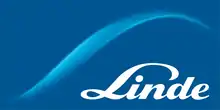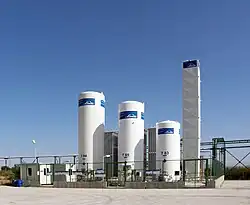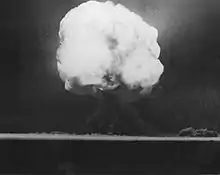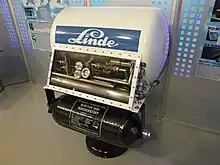Linde plc
Linde plc is a global multinational chemical company founded in Germany and, since 2018, domiciled in Ireland and headquartered in the United Kingdom. Linde is the world's largest industrial gas company by market share and revenue. It serves customers in the healthcare, petroleum refining, manufacturing, food, beverage carbonation, fiber-optics, steel making, aerospace, material handling equipment (MHE), chemicals, electronics and water treatment industries.[1] The company's primary business is the manufacturing and distribution of atmospheric gases, including oxygen, nitrogen, argon, rare gases, and process gases, including carbon dioxide, helium, hydrogen, ammonia, electronic gases, specialty gases, and acetylene.[1]
 | |
| Type | Public limited company |
|---|---|
| ISIN | IE00BZ12WP82 |
| Industry | Chemical industry |
| Founded | 21 June 1879 |
| Founder | Carl von Linde |
| Headquarters | |
Key people | |
| Products | Industrial gas production, medical gas and air separation physical plant engineering, logistics services |
| Revenue | |
| Total assets | |
| Total equity | |
Number of employees | 65,010 (2022) |
| Subsidiaries | Praxair, Lincare Holdings, Afrox, American HomePatient, NuCo2, AUECC, GTG Plin, Nauticor |
| Website | linde |
| Footnotes / references [1][2] | |

The company was formed by the 2018 merger of Linde AG of Germany (founded in 1879) and Praxair (founded in 1907 as Linde Air Products Company) of the United States. The resulting holding company was incorporated in Ireland, with principal executive offices in Woking, UK.[3]
The company is a member of the Hydrogen Council, a group of companies investing in hydrogen vehicles.[4][5] The company expects hydrogen vehicles to compete with electric vehicles and has invested in wind powered plants that convert water to hydrogen.[6]
The company is ranked 463rd on the Fortune Global 500[7] and 187th on the Forbes Global 2000.[8]
Operations
The company has two principal business areas: gas (industrial gases and medical gases), and engineering, procurement, and construction.
Gases
In the industrial gas area, the company uses the brand names Linde, AGA, BOC, TIG, Mox-Linde Gases, Afrox, Sigas and PanGas. HiQ is used as an identifier for high purity and premium specialty gases across all of these business brand names.
In the medical gas area, the company uses the brand names Linde Gas Therapeutics, AGA Medical, INO Therapeutics, Linde Homecare, and Farmadomo.
Linde Gas supplies industrial gases, medical gases, specialty gases, refrigerants and other chemicals. Depending on the gas and the quantity required, these may be supplied in portable high-pressure gas cylinders, in liquefied form by road tanker, from on-site gas generators or in gaseous form via pipeline to large customers. This division has four operating segments, Western Europe, the Americas, Asia & Eastern Europe, and South Pacific & Africa. These segments are subdivided into eight Regional Business Units (RBUs). The Gases Division also includes the two Global Business Units (GBUs) – Healthcare (medical gases) and Tonnage (on-site) – and the two Business Areas (BAs) – Merchant & Packaged Gases (liquefied and cylinder gases) and Electronics (electronic gases).
The product range includes hydrogen, acetylene, carbon monoxide, carbon dioxide, shielding gases for welding applications, noble gases and specialty gases, oxygen, nitrogen, and argon, all of which are manufactured in Linde's air separation plants.
Linde Healthcare provides pharmaceutical and medical gas products and services for the healthcare industry such as oxygen therapy, aerosol therapy, anaesthesia, and gas for chronic obstructive pulmonary disease, asthma, sleep apnoea and pain.
Linde Engineering
Linde Engineering designs and builds large-scale chemical plants for the production of industrial gases including oxygen, nitrogen, argon, hydrogen and carbon monoxide, as well as large plants associated with the processing of natural gas, LNG, Liquefied petroleum gas and the manufacture of olefins. The Engineering Division develops process plants in the engineering, procurement and construction (EPC) business worldwide.
The group has more than 1,000 process engineering patents and 4,000 completed plant projects. [9]
The product range includes:
- Air separation plants
- Ethylene Cracker Units
- Liquefied natural gas and Natural-gas processing plants
- Hydrogen and synthesis gas plants
- Chemical plants
- Adsorption and membrane plants
- Cryogenics plants
- Carbon capture and storage and carbon dioxide plants
- Furnaces, Incineration and heaters
- Plant components[9]
History

On 21 June 1879, Carl von Linde founded the Gesellschaft für Linde's Eismaschinen Aktiengesellschaft to develop further his work in developing mechanical refrigeration systems for the brewing and food industries. Following success in this market, he moved on to developing lower temperature systems resulting in 1895 in a patent covering the liquefaction of air. Out of this work his company developed equipment for the separation of air and other gases. Linde's process was patented in 1902 and immediately exploited by the first large-scale air separation plant installed in Linde's works in Höllriegelskreuth, near Munich in 1903.[11]: 67
In 1906, Carl Von Linde decided to expand his oxygen extraction company overseas, targeting America, where no other companies had attempted industrial scale oxygen extraction. Along with Cecil Lightfoot, in 1907, he opened the Linde Air Products Factory, his first plant in America at Buffalo, New York.[14][15]
In addition to plants for air separation, in 1906, Linde engineers started working with others on processes to separate the constituents of water gas.[15] This work lead to the 1909 invention of the Linde–Frank–Caro process to produce hydrogen and carbon monoxide, which were further key feedstocks for the emerging chemicals industry.
In addition to his interests in refrigeration, Carl von Linde had also partnered with Hugo Güldner and Georg Krauß and others in 1904 to form the Güldner Motoren-Gesellschaft mbH in Munich, which was moved to Aschaffenburg in 1906. Linde took full ownership of the company in 1929, and from this origin developed a business manufacturing first engines and tractors, and then from the 1950s onwards, a range of mechanical handling equipment such as fork lift trucks. Linde also acquired the Aktiengesellschaft für Industriegasverwertung (english: Corporation for Industry Gas Utilization), commonly referred to as the Heylandt Works.
Following World War I, Linde's U.S. assets were confiscated. They were incorporated into the Union Carbide Corporation (UCC) as the Linde Air Products division in 1917.[16]
In the years of Nazi Germany, Linde AG benefited from the country's attempt to become self-sufficient by refraining from imports of synthetic fuel and rubber. In 1935, general manager Friedrich Linde received the title of Wehrwirtschaftsführer, which underlined the national importance of Linde AG and allowed the company to further benefit from the German rearmament.[11]: 99
Before and during World War II, all departments of Linde AG were in some way involved in the armaments production: The Heylandt-Gesellschaft für Apparatebau supplied the German rocket program, other branches produced welding equipment and engines for the armaments industry.[11]: 111 In 1941, Linde manufactured oxygen and helium installations for IG Farben at the Auschwitz concentration camp. Three further planned installations were not installed due to the course of war.[11]: 113–114 According to estimates of the company for mid-1944, between 400 and 500 people were used as forced labourers in production plants.[11]: 115 The company claimed that 75% of its production facilities were destroyed during the war.[11]: 126
In 1958, the company tested a hydraulic drive system in the "Hydrocar".[15]
In 1989, the company acquired Lansing Bagnall, a British forklift manufacturer.
In 1996, the company acquired the rights to the Linde name from Praxair.[17]
In 2000, the company completed the acquisition of AGA AB of Sweden for $3.71 billion.[18][19]
In the early 2000, Brazilian auction was invented as a new type of auctions to trade gas by electronic auctions for Linde plc in Brazil.[20][21]
In 2004, the company sold its refrigeration division to Carrier Corporation for €325 million.[22]
In September 2006, Linde acquired BOC for €11.7 billion in cash.[23][24]
Linde's forklift business was rebranded as KION Group and sold to KKR and Goldman Sachs for €4bn in January 2007.[25]
In March 2007, the BOC Edwards semiconductor equipment business was sold to private equity firm CCMP Capital for €685m.[26][27][28] Also in March 2007, eight air separation units and related bulk gas business, with about 300 employees, were sold to Airgas for $495 million in cash.[29]
In April 2007, the company sold the industrial gas business of BOC Gazy to Air Products & Chemicals for €370 million or about $503 million.[30]
In 2008, the head office of Linde AG was relocated from its historic headquarters in Wiesbaden to the Angerhof building in downtown Munich.[31]
In 2010, the company acquired over 95% of the shares of Sri Lanka-based Ceylon Oxygen Ltd.[32]
In June 2011, PT Linde Indonesia, a subsidiary of Linde, announced its plan to build an air separation plant worth Rp.1 trillion ($117.33 million) in Cilegon, Banten to supply industrial gas to PT Krakatau Steel's steel plant.[33]
In May 2012, the company acquired the Belgium, France, Germany, Portugal and Spain homecare business of Air Products & Chemicals for €590 million.[34]
In August 2012, the company acquired Lincare Holdings, a healthcare gas provider in the USA for US$4.6 billion to become the largest home care gas supplier in North America.[35][36]
In December 2012, the company acquired homecare company Calea France SAS.[37]
In February 2016, Lincare Holdings acquired American HomePatient, Inc.[38]
In December 2016, Linde Korea completed the acquisition of Air Liquide Korea's industrial merchant & electronics and liquid bulk air gases divisions, based in South Korea.[39]
In early June 2017, after almost a year of on-and-off negotiations, Linde and Praxair, the successor to UCC's Linde Air Products division, agreed to merge.[40]
In July 2018, the company agreed to sell certain business in North and South American assets to Messer Group and CVC Capital Partners for $3.3 billion to gain regulator approval for the Praxair merger.[41][42][43]
On 31 October 2018, the merger was completed except finalising divestitures required by the respective antitrust authorities.[44] On 1 March 2019 the company completed divestitures required by US antitrust authorities.[45]
On 28 February 2019, Matheson acquired Linde HyCO, divested to comply with the regulatory terms of the Praxair merger.[46]
On 9 August 2019 Linde partnered with CarbonCure Technologies.[47]
On 29 August 2019, the company acquired a 10% stake in Hydrospider, a Swiss producer and supplier of hydrogen derived from renewable energy sources.[48][49]
In October 2019, the company invested £28 million in ITM Power, a British manufacturer of polymer electrolyte membrane electrolyzers for hydrogen production via electro-chemical splitting of water into hydrogen and oxygen.[50][51]
In January 2020, the company sold its LifeGas division.[52]
In April 2020, Gasum acquired the company's LNG and Biogas business in Sweden and Norway.[53][54]
In September 2022, Linde sold Gist Limited to Marks & Spencer for £145 million.[55] Gist, headquartered at Chineham Business Park, Basingstoke, offers supply chain services including end-to-end management and customer fulfilment through transport and warehousing. Gist was acquired by Linde as part of its 2006 acquisition of BOC.[56]
 Linde Gas Schiedam Storage
Linde Gas Schiedam Storage Tank for liquid hydrogen of Linde, Museum Autovision, Altlußheim
Tank for liquid hydrogen of Linde, Museum Autovision, Altlußheim.JPG.webp) trailH2
trailH2 Linde E20
Linde E20_air_separation_plant_in_Washington%252C_West_Virginia..JPG.webp) Linde air separation plant in Washington, West Virginia
Linde air separation plant in Washington, West Virginia
Financial data
| Year | 2013 | 2014 | 2015 | 2016 | 2017 | 2022 |
|---|---|---|---|---|---|---|
| Revenue | 16.655 | 17.047 | 17.944 | 16.948 | 17.113 | 33.4 ($) |
| Net Income | 1.430 | 1.162 | 1.252 | 1.327 | 1.536 | 4.1 ($) |
| Assets | 32.749 | 34.425 | 35.347 | 35.189 | 33.513 | 79.7 ($) |
| Employees | 63,487 | 65,591 | 64,538 | 59,715 | 57,605 | 65,010 |
References
- "Linde plc 2022 Form 10-K Annual Report". U.S. Securities and Exchange Commission. 28 February 2023.
- "Leadership".
- "Linde plc - Imprint - Information about incorporation". Retrieved 21 May 2021.
- Amelang, Sören (3 April 2019). "Gas group Linde says it is "absolutely sure" there is a future for hydrogen cars". Clean Energy Wire.
- "Gas Group Linde says it is "absolutely sure" there is a future for hydrogen cars". Fuel Cells Works. 4 April 2019.
- Smalley, Joshua (10 July 2015). "Linde wind plant a necessary step in creating hydrogen-fueled cars". Wind Power Engineering & Development.
- "Fortune Global 500: Linde". Fortune.
- "Linde". Forbes.
- "Linde Engineering". Archived from the original on 24 May 2016.
- "Linde Air Products". National Institute for Occupational Safety and Health. Archived from the original on 24 September 2015.
- Dienel, Hans-Liudger (14 June 2004). Linde: History of a Technology Corporation, 1879-2004. Palgrave Macmillan. ISBN 978-0-230-50953-5.
- Blumenthal, Ralph (1 February 1981). "Big Atom Waste Site Reported Found Near Buffalo". The New York Times. Archived from the original on 4 March 2017.
- "Fact Sheet Tonawanda New York Site". United States Department of Energy. Retrieved 12 March 2023.
- Almqvist, Ebbe (2003). "Development of the Industrial Gas Business". History of Industrial Gases. Springer Science+Business Media. pp. 187–302. doi:10.1007/978-1-4615-0197-8_5. ISBN 978-1-4613-4962-4.
- "125 Years of Linde, A Chronicle" (PDF).
- "History - Union Carbide Company".
- "PRAXAIR SELLS RIGHTS TO LINDE NAME TO LINDE A. G.". The New York Times. Dow Jones & Company. 19 January 1996.
- "Linde buys Swedish gas group AGA for pounds 2.3bn". The Independent. 17 August 1999. Archived from the original on 14 June 2022.
- Latour, Almar (17 August 1999). "Linde Plans to Acquire AGA In Deal Totaling $3.71 Billion". The Wall Street Journal.
- "Enterprise Sourcing Cockpit 4.5: Höhere Benutzerfreundlichkeit und neue Auktionsform". PortalDerWirtschaft.de (in German).
- Bernhard, Andreas. "Elektronische Auktionen und Ausschreibungen bei Linde Gas – Die Spieltheorie im E-Sourcing" (PDF). chemietechnik.de. Archived from the original (PDF) on 29 January 2020. Retrieved 29 January 2020.
- Ong, Russell (15 March 2004). "Linde sells refrigeration business to US Carrier Corp for Euro325m". ICIS.
- "Linde completes BOC takeover". The Guardian. 6 March 2006.
- "Linde acquires BOC". The Economic Times. 7 September 2006.
- Laessing, Ulf (19 January 2007). "Linde sells forklift unit Kion to Goldman, KKR". Reuters.
- Goldstein, Steve (12 March 2007). "Linde sells BOC Edwards components unit for $900 million". MarketWatch.
- "Linde sells BOC Edwards unit to CCMP". The Boston Globe. 12 March 2007.
- LaPedus, Mark (12 March 2007). "Linde sells BOC to buyout specialist". EE Times.
- "Airgas Completes Acquisition of Linde's Divested U.S. Bulk Gas Assets" (Press release). Business Wire. 9 March 2007.
- "Air Products Completes Purchase of BOC Gazy from Linde" (Press release). Air Products & Chemicals. 30 April 2007. Archived from the original on 27 July 2019. Retrieved 26 September 2020.
- "Für Linde liegt die Zukunft in München" [For Linde, the future lies in Munich]. Handelsblatt (in German). 10 October 2006.
- "The Linde Group acquires majority stake in Ceylon Oxygen Limited" (Press release). Linde plc. 16 October 2010.
- "Linde Indonesia to build Rp 1 trillion air separation plant". The Jakarta Post. 11 June 2011.
- "Linde completes acquisition of Air Products' Continental-European homecare business following European Commission approval" (Press release). Linde. 2 May 2012.
- "Linde to Acquire Lincare Holdings Inc. in a Friendly Transaction by Way of a Tender Offer and Merger" (Press release). GlobeNewswire. 2 July 2012.
- De La Merced, Michael (1 July 2012). "Linde of Germany to Buy Lincare for $3.8 Billion". The New York Times.
- "Linde acquires homecare company Calea France SAS" (Press release). Marketwire. 17 December 2012.
- "Lincare, a Linde subsidiary, closes acquisition of American HomePatient". Linde plc. 2 February 2016.
- "Linde Korea completes acquisition of Air Liquide Korea's industrial merchant and electronics on-site and liquid bulk air gases business in South Korea". PR Newswire. 15 December 2016.
- Prodhan, Georgina (June 2017). "Linde, Praxair agree $73 billion merger to create global gases leader". Reuters. Archived from the original on 3 June 2017.
- Burger, Ludwig (16 July 2018). "Linde sells assets for $3.3 billion to help get Praxair deal cleared". Reuters.
- Bernhard, Max (16 July 2018). "Linde to sell Americas assets to Messer, CVS". MarketWatch.
- Henning, Eyk; Sachgau, Oliver (19 September 2018). "Linde, Praxair Offload Assets to Prepare for $45 Billion Merger". Bloomberg News.
- "Business Combination Between Praxair and Linde AG Successfully Completed" (Press release). linde.com.
- "Linde plc Completes Required Divestitures, Hold Separate Order Restrictions Lifted" (Press release). linde.com.
- "MATHESON Acquires HyCO Business from Linde" (Press release). Business Wire. 28 February 2019.
- "Linde partners with CarbonCure to bring CO2 utilisation to Europe and Asia-Pacific". GasWorld.com. 9 August 2019.
- "Linde takes 10% stake in Swiss hydrogen group". Reuters. 29 August 2019.
- "Linde buys into Hydrospider for green hydrogen". Electrive. 29 August 2019.
- "Linde Acquires Minority Stake In ITM Power and Agrees Joint Venture" (Press release). AccessWire. 29 October 2019.
- "ITM Power Announces Joint Venture with Linde AG and £38M Strategic Investment". Fuels Cells Works. 29 October 2019.
- Klyce, John (13 January 2020). "nexAir makes acquisition, gains 200 employees". American City Business Journals.
- "Gasum strengthens capacity to offer gas solutions for transport and industry in the Nordics – The acquisition of Linde AG's LNG and Biogas business and Nauticor's Marine Bunkering now closed" (Press release). Gasum. 30 April 2020.
- Karagiannopoulos, Lefteris (13 November 2019). "Finland's Gasum boosts LNG business in Nordics with Linde deal". Reuters.
- "Marks & Spencer completes acquisition of Gist". Financial Times. 30 September 2022.
- Gow, David (6 March 2006). "Germany's Linde acquires BOC to create world's biggest gases group". The Guardian. ISSN 0261-3077.
- "Linde Bilanz, Gewinn und Umsatz | Linde Geschäftsbericht | 648300". wallstreet-online.de. Retrieved 5 November 2018.